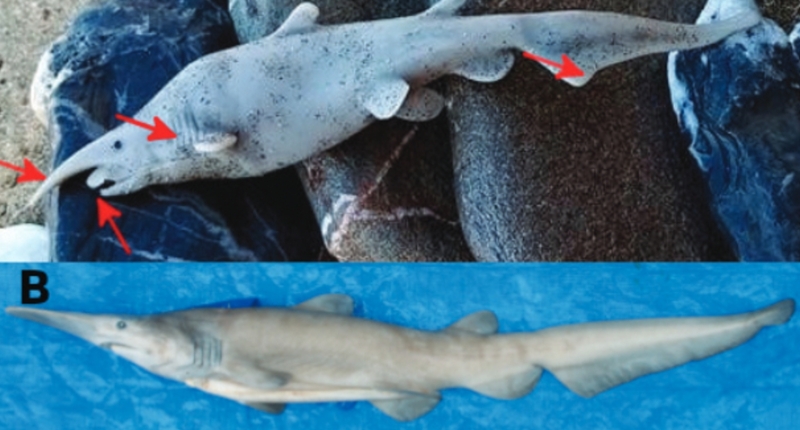Scientists have officially retracted their claim of finding the first-ever goblin shark in the Mediterranean, citing remaining uncertainty due to the lack of direct contact between the authors and the citizen scientist and the absence of a sample to support the record. The retraction applies to both the initial publication and the authors’ follow-up comment. The controversy surrounding the goblin shark sighting in the Mediterranean has sparked discussions about the role of citizen science in shark research and the importance of rigorous scientific standards in verifying claims. While the authenticity of the photographed specimen remains uncertain, it is possible that goblin sharks are swimming in the depths of the Mediterranean, waiting to be discovered. The retraction of the record puts an end to the controversy in the world of shark science and raises questions about the future of research funding and marine conservation spending in the region.
Scientists retract first-ever goblin shark sighting in Mediterranean
A group of scientists has retracted a previous claim of finding the first-ever goblin shark in the Mediterranean. The original record was published in the journal Mediterranean Marine Sciences in May 2022 and was based on a low-quality photograph provided by a citizen scientist. The photograph did not contain scale, and the scientists did not interact with the alleged sample directly. The authenticity of the specimen was questioned by many marine biologists, who noted its unusual appearance, including solid fins, completeness, lack of visible damage, incorrect number of gill slits, small size, and the odd shape of some of the segments.
Although the purported sighting, if true, would have been an important discovery, marking an extension of the goblin shark’s range, many doubted its validity. Shark experts expressed skepticism on Twitter and a Facebook group, and the magazine received a critical comment in November 2022.
In response, the authors of the study argued that the specimen was real, suggesting that it might be a goblin shark fetus with a deformed mouth due to eating eggs in the womb. They doubled down on this view in a subsequent publication, but their arguments failed to convince the scientific community.
The scientists eventually retracted their claim in a report filed on March 20, which puts an end to the controversy in the world of shark science. It remains to be seen whether future research funding or marine conservation spending will be affected by the retraction.
Goblin sharks, which are distinctively nightmarish-looking deep-sea fish, have been documented in many places around the world but never before in the Mediterranean.
Scientists retract first-ever goblin shark sighting in Mediterranean after controversy
Scientists have officially retracted their claim of finding the first-ever goblin shark in the Mediterranean, which was based on a single low-quality photograph provided by a citizen scientist in May 2022. The record was published in the journal Mediterranean Marine Sciences and was the subject of controversy among shark experts and marine biologists who doubted its authenticity due to the unusual appearance of the photographed sample.
Several experts, including independent shark researchers and a scientist studying plastic degradation at Duke University, suggested that the specimen looked like a degraded plastic toy or a model for such a shark. In November 2022, one of the independent shark researchers published a critical comment in the magazine. The authors of the study doubled down on their claim that the specimen was real and suggested that it might be a goblin shark fetus with a deformed mouth due to eating eggs in the womb.
Despite this, the authors eventually retracted their claim in a notice released online this week. They cited remaining uncertainty due to the lack of direct contact between the authors and the citizen scientist and the absence of a sample to support the record. The retraction applies to both the initial publication and the authors’ follow-up comment.
The controversy surrounding the goblin shark sighting in the Mediterranean has sparked discussions about the role of citizen science in shark research and the importance of rigorous scientific standards in verifying claims. While the retraction of the study may disappoint some, it also demonstrates the scientific community’s commitment to upholding the integrity of scientific knowledge.
Goblin sharks, which are distinctively nightmarish-looking deep-sea fish, have been documented in many places around the world but never before in the Mediterranean. The retraction of the record puts an end to the controversy in the world of shark science and raises questions about the future of research funding and marine conservation spending in the region.
Co-author explains retraction of first-ever goblin shark sighting in Mediterranean
Co-author Frithjof Kuepper of the University of Aberdeen in Scotland has explained the decision to retract the record of the first-ever goblin shark sighting in the Mediterranean. He cited the controversy surrounding the record and the lack of preservation of the specimen as reasons for the retraction. Kuepper also noted that many Mediterranean shark experts and two anonymous peer reviewers had accepted and supported the publication of the record.
The controversy surrounding the sighting has led to discussions about the importance of scientific standards and the role of citizen science in shark research. While the authenticity of the photographed specimen remains uncertain, it is possible that goblin sharks are swimming in the depths of the Mediterranean, waiting to be discovered.
The retraction of the record puts an end to the controversy in the world of shark science and raises questions about the future of research funding and marine conservation spending in the region.
Don’t miss interesting posts on Famousbio

